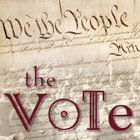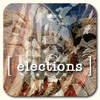
|
11 June 2006 Since the 2000 election, voting technology has become a major issue in US elections regimens and regulations; touchscreen balloting machines, which legislatures seem to have favored as a way to record votes accurately, eliminating the 'hanging chad' problem, were designed with no paper record and have proven insecure and susceptible to tampering. Now, 26 US states have passed laws requiring paper trails, and 13 more, plus Washington, DC, have proposed laws "not yet enacted". The organization Verified Voting has waged a campaign to pass nationwide legislation requiring "voter-verifiable paper trails" for all forms of balloting, to avoid a situation where large numbers or even all votes in a given election could become subject to malicious interference or to a random computer glitch or accidental virus infection. The issue is disenfranchisement: the very real risk that individual citizens' votes will be lost or manipulated by election officials, poll workers or technicians. A key piece of proposed legislation, HR-2239, proposed by Rep. Rush Holt (D-NJ), of the 12th district —where Sentido is based—, in 2003, and requiring that all electronic machines carry a voter-verifiable paper trail or ballot hard copy by the 2004 elections, never took full effect. Rep. Holt proposed similar legislation, HR-550, in 2005, in hopes of achieving the necessary reforms by the 2006 elections. The senate proposed identical legislation in the form of S.1980, sponsored by Sen. Bob Graham (D-FL). As with HR-2239, the last action taken by the Congress was the reading of the bill and its entering in the record. 'Opening remarks' were made for debate on HR-2239, but the issue did not proceed further. At present, HR-550 —'Voter Confidence and Increased Accessibility Act of 2005'—, with 189 co-sponsors having signed on, is the best chance for comprehensive national legislation to ensure paper trails to register actual votes, enabling recounts and election systems abiding by existing laws. [s]
BACKGROUND: Reports have emerged that according to the San Diego registrar of voters, poll workers in San Diego county took tamper-susceptible Diebold voting machines home on the eve of the election. In some cases, poll workers may have had unsupervised access to the machines for a week or longer. [Full Story] FLORIDA'S LOST & FOUND ELECTRONIC VOTES The Supervisor of Elections for Miami-Dade County, Florida, announced Friday that her office had recovered missing electronic records of touch-screen votes from the 2002 primary elections in the race for Florida Governor. The records had been reported lost, after a series of computer crashes appeared to have wiped out the electronic files containing the record of the votes. [Full Story] EAC RECOGNIZES NEED FOR "ENHANCED SECURITY MEASURES" IN TOUCHSCREEN BALLOTING The Election Assistance Commission, set up by the 2002 Help America Vote Act to provide nationwide oversight of election processes and to seek to prevent any debacle resembling the 2000 Florida recount, has voiced support for "paper verification" and "enhanced security measures" to guarantee legitimacy of touch-screen votes. For some time, verified voting activists have been troubled by the unwillingness of members of Congress to support legislation to require a paper record of electronic votes until the EAC makes its recommendations. [Full Story] ELECTRONIC VOTING MACHINES FAIL IN PRIMARIES
5 March 2004 As the United States shifts as much as 20% of its balloting devices to electronic voting systems, new doubts arise about the integrity, security and fairness of the systems being implemented. In the "Super Tuesday" primary vote across 10 states, serious glitches occurred, erasing and preventing votes: 10% of machines in San Diego county experienced technical problems; 1 in six voters in Alameda county were turned away by machine glitches. The CEO of Diebold, which makes most widely used electronic balloting machines has declared partisan allegiance and his desire to "deliver... electoral votes to the president" in 2004. [Full Story] |
|||||||||||||||||||||||||||||||||||||||
|
||||||||||||||||||||||||||||||||||||||||









